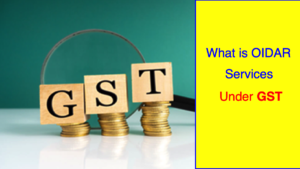OIDAR Services Under GST, Full Form, Tax, and Registration Type, How to register for OIDAR Classification at official website.
What is OIDAR?
Online Information Database Access and Retrieval (OIDAR) services encompass a variety of digital services that are delivered online without the provider or recipient being physically present. OIDAR services are subject to GST and have significant importance in the context of India’s digital economy, especially for cross-border transactions and foreign service providers.

OIDAR Full Form in GST?
Online Information Database Access and Retrieval (OIDAR)
Examples of OIDAR Services:
OIDAR services refer to digital services consumed online, such as:
- Software-as-a-Service (SaaS): Cloud-hosted applications delivered via the internet.
- Online Gaming: Games played on the internet that require subscriptions or purchases.
- Streaming Services: Digital content like movies, music, e-books, etc.
- E-learning Platforms: Online education or training services provided remotely.
- Web Hosting & Data Management: Internet-based data storage and website hosting services.
This broad classification has made OIDAR essential for entities providing online services, especially when servicing customers outside their tax jurisdiction.
OIDAR and GST Compliance:
- GST Rate:
OIDAR services are subject to an 18% GST under the Integrated Goods and Services Tax (IGST) for both domestic and international service providers. However, some services like e-books may attract a lower rate of 5% under HSN code 9984. - Foreign Providers:
If a foreign company provides OIDAR services to an Indian consumer, it must register for GST. As per Section 14 of the IGST Act, the foreign supplier is required to pay GST even if they do not have a physical presence in India. In this scenario, an Indian agent may be appointed to handle tax matters. - GST Registration:
Both local and foreign providers need to register under GST for OIDAR services if they supply to Indian consumers. This ensures compliance with the tax law and avoids penalties.
OIDAR Registration Process
The registration process is straightforward and includes:
- Step 1: Go to the GST Portal and click on the “New Registration” tab.
- Step 2: Fill in your PAN, email, mobile number, and business details.
- Step 3: Complete verification using the OTP sent to your mobile and email.
- Step 4: Submit the required documents and wait for the confirmation.
Once registered, you’ll receive an Application Reference Number (ARN) that can be used to track the status of your registration. This ensures that businesses providing OIDAR services to Indian consumers comply with GST regulations.
Impact of OIDAR on Cross-Border Services:
For foreign service providers without a physical presence in India, Section 14 of the IGST Act mandates the need for registration if the service is consumed by an Indian entity or individual. This rule ensures that all OIDAR services, whether offered by domestic or foreign providers, are taxed at a standard rate, ensuring fair market practices. Additionally, it prevents service providers from dodging taxes by operating outside Indian borders.
OIDAR and Indian Taxation Law:
The introduction of GST for OIDAR services aims to ensure a fair taxation regime in India, especially for digital services crossing international borders. Before this, digital services provided by foreign entities were often left untaxed, causing a disparity in the marketplace.
The tax applies to services delivered over the internet, where service providers, including those abroad, need to register for GST and pay taxes according to the Indian tax code if their services are accessed by Indian consumers.
Common OIDAR Services and Their GST Treatment:
| Service Type | Tax Rate | HSN Code |
|---|---|---|
| E-books, Digital Media | 5% | 9984 |
| SaaS, Software, Cloud Services | 18% | 9984 |
| Online Training & E-Learning | 18% | 9984 |
| Streaming & Downloadable Content | 18% | 9984 |
By ensuring all services fall under GST, India has created an equal opportunity marketplace where even foreign service providers are taxed similarly to domestic ones.
Who Can Apply for OIDAR Classification?
- Foreign Providers: Companies providing OIDAR services to Indian consumers from outside India.
- Domestic Digital Providers: Indian businesses offering services online, including educational platforms, digital content creators, and cloud-based software providers.
- Cloud & IT Services Providers: Businesses offering web hosting, SaaS, and other cloud services, whether locally or internationally, must register under OIDAR to ensure proper tax compliance.
How to Apply for OIDAR GST Classification
To get registered for OIDAR under GST, follow the steps provided above. The registration ensures businesses offering digital services across borders remain compliant and avoid hefty penalties. Additionally, foreign businesses that do not have a physical presence in India should appoint an agent to handle tax compliance.
FAQs on OIDAR Services:
What does OIDAR stand for?
OIDAR refers to Online Information Database Access and Retrieval Services provided digitally, often across borders.
What are some examples of OIDAR services?
OIDAR services include e-learning, SaaS, streaming services, cloud storage, online gaming, and e-books.
What is the GST rate on OIDAR services?
Most OIDAR services attract an 18% GST rate, but certain services like e-books may have a lower 5% rate.
How can foreign service providers comply with Indian GST laws?
Foreign providers must register for GST if they supply OIDAR services to Indian customers and appoint a local agent for tax compliance.
Is GST mandatory for small digital service providers?
Yes, all providers offering OIDAR services to Indian consumers, irrespective of size, must register for GST.
Conclusion:
OIDAR services, encompassing a wide array of digital offerings, are crucial to the global economy. With India’s GST regulations in place, both foreign and domestic service providers are required to comply, ensuring a fair taxation framework. By registering for OIDAR services under GST, businesses can avoid legal complications and remain competitive in the digital marketplace.